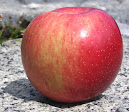
|
| In the U.S., "cider" is sweet cider; fermented cider is called hard cider. |
Sweet cider is just the unfermented juice of pressed apples, unfiltered and unsweetened. It's so sweet that I do not drink much of it.
When I do, the best is unpasteurized. But chance has brought a jug of each my way, pasteurized and not, so I thought an apples-to-apples comparison was in order.
Pasteurization entails heating the cider to kill germs, which cooks the cider and changes the taste.
My pasteurized version includes a preservative. The raw cider is made of 100% apples.
Appearance
As you can see, I did not need to label the glasses of cider to tell them apart. The pasteurized cider, at left, is cloudy, more opaque, even milky looking compared to its neighbor, though both are a similar shade of brown.Aroma
All apple cider smells a little like bruised apples, but the pasteurized cider also smells like filtered apple juice. The smell of the raw cider by comparison includes a seductive whiff of maple syrup.Taste
Mr. Pasteurized is Mr. Smooth, even and sweet, with a hint of pear in the mix.The unpasteurized cider is sharper and more complex. It suggests an alcoholic beverage (which it would become if I kept it long enough), vinous and resinous and earthly. It tastes alive.
Which it is.
The Verdict
That's why I prefer unpasteurized. But the cooked stuff is not bad—and is still good nearly a month after neighbors gave me a gallon of it.A Few More Notes
I find all cider very sweet, even cloying at room temperature. I drink it chilled for that reason.Unpasteurized cider can be contaminated with harmful bacteria and is not recommended for infants and people with compromised immune systems.
It's probably a good thing that mass-produced cider is pasteurized, since one bad apple could sicken many people.
Raw cider can be found at select orchards and sometimes at farmers market. You'll probably have to hunt for it.
This tasting was fun to write partly because I could play the wine snob, swirling the cider in the glass and "chewing" it to aerate in my mouth (which was revealing). No spitting, however.
Cider's flavor, especially raw, depends on the apples pressed to make it. What's ripe varies week to week.
Someone (not me) could write a whole blog of seasonal cider tastings.
Cider freezes really well. You can stick a jug of it in your freezer in November and drink it with pleasure in June.
It has also been the official state beverage of New Hampshire since 2010.


What would one call the cloudiness in raw cider? Mother?
ReplyDeleteCloudiness in cider wouldn't be called the Mother - it hasn't had enough time to form. It's just the apple solids that haven't been super-filtered out. And that's part of what makes it taste so good.
ReplyDeleteAs for the cloying sweetness, it's likely due to the blend of apples, which is too often overwhelmed with surplus dessert apples (red delicious). A better mix would include more acidic apples and some with bitter or tannin content. This is required for hard cider, but even for sweet cider it's important.
This review is old enough that you might consider redoing your taste test. Many MA ciders (and others) now include apple peel powder to 'bump up" the apple flavor and the vitamins. I wonder if you can taste the difference?
ReplyDelete